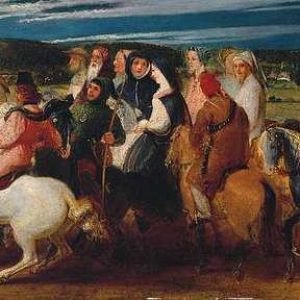The Canteburry Tales

Summary:
One spring day, the Narrator of The Canterbury Tales rents a room at the Tabard Inn in London, before continuing his journey to Canterbury the following day. That evening, a group of people arrive at the inn, all of whom are also going to Canterbury to receive the blessings of the holy blissful martyr St. Thomas Becket. Calling themselves “pilgrims” because of their destination, they accept the Narrator (Geoffrey Chaucer) into their company. During the course of the evening Harry Bailey, the host of the Tabard Inn suggests that, to make the trip to Canterbury pass more pleasantly, each member of the party tell two tales on the journey to Canterbury and two more tales on the return journey. The person who tells the best story will be rewarded with a sumptuous dinner paid for by the other members of the party. The Host decides to accompany the pilgrims to Canterbury and serve as the judge of the tales.
The Wife of Bath
Bath is an English town on the RiverAvon. She is a seamstress (dress maker) by occupation, the wife has a lot of experience under her belt. She has traveled all over world on pilgrimages: she has been to Jerusalem three times, as well as to Santiago de Copostella, therefore Canterbury is a jaunt compared to other perilous journeys she has endured. Not only has she seen many lands, she has lived with five husbands. She is worldly in both senses of the word: she has seen the world and has experience in the ways of the world, that is, in love and sex. She is deaf in one ear and has a gap between her front teeth, a physical trait that was considered attractive in Chaucer’s time. The wife’s clothes are rich and tasteful and quite extravagant: her face is wreathed in heavy cloth, her stockings are a fine scarlet color, and the leather on her shoes is soft, fresh, and brand new. All of which demonstrate how wealthy she has become. Scarlet was a particularly costly dye, since it was made from individual red beetles found only in some parts of the world.
The Pardoner
Pardoners granted papal indulgences or rather reprieves from penance in exchange for charitable donations to the Church. Many pardoners, including this one, collected profits for themselves. In fact, Chaucer’s Pardoner excels in fraud, carrying a bag full of fake relics for example; he claims to have the veil of the Virgin Mary. The Pardoner has long, greasy, yellow hair and is beardless and his features resemble those of a baby. These characteristics were associated with shiftiness and gender ambiguity in Chaucer’s time. The Pardoner also has a gift for singing and preaching whenever he finds himself inside a church. The Pardoner intends to cash in on religion in any way he can, and he does this by selling tangible, material objects whether it be slips of paper that promise forgiveness for sins, or animal bones that people may string around their necks as good luck charms against the devil.
The Prioress
Madame Eglantine, is a central character in the Tale. Madame Eglantine’s character serves as a sort of satire of the day, she is a nun who lives a secular lifestyle. It is implied that she uses her religious lifestyle as a means of social advancement. Madame Eglantine is beautiful, graceful, well-mannered and kind and prays with “the elegance of a blissful queen.” However, her mispronounced French and strange mannerisms suggest that she was once came from the lower-classes. Her eyes are “glass-gray”, her nose is small and elegant and her mouth is dainty, soft and red. These small features illustarate a certain amount of irony as they are in sheer contrast with her forehead and stature which are quite large, as if to underline the contradictions of the character. Instead of carrying rosary beads with a crucifix around her wrist, she wears coral beads that are attached to a pendant which says, “Amor Vincit Omnia” or “Love Conquers All”. She is very mannerly, never letting the tiniest morsel of food fall from her mouth, nor dipping her silverware to deep into her sauce. The Prioress has a tender and sentimental heart. She is so kind and charitable that the sight of a small animal would cause her to cry. The Prioress would feed homeless dogs meat, milk or fine white bread. She is friendly, entertaining and pleasant to the other characters, however, she seems to enjoy solitary company, so she distances herself away from the others.
